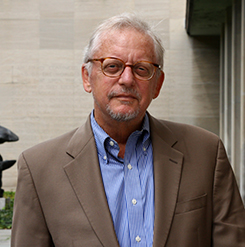Download PDF:
John Tirman, the Center's executive director and principal research scientist, is author, or coauthor and editor, of fourteen books on international affairs, including, most recently, Dream Chasers: Immigration and the American Backlash (MIT Press, 2015) and The Deaths of Others: The Fate of Civilians in America’s Wars (Oxford University Press, 2011). Banner image: Wikipedia Commons

John Tirman is executive director of and principal research scientist at MIT's Center for International Studies. Photo: Allegra Boverman
précis: What is the Human Rights Revolution?
JT: The Human Rights Revolution is a loose concept but it’s a phenomenon among governments particularly as well as NGOs and activists that emerged after the Second World War. At the time, there was a gradual but discernible expansion of rights, especially in the Global South with post-colonial movements and state-building. It was not a perfectly smooth phenomenon because the Cold War served as a counter to it. However, by the 1960s and mid 1970s, governments were being held accountable in ways that they weren’t held accountable before. This was also the era of the rise of groups like Human Rights Watch and Amnesty International.
précis: Do you see the decline of the Human Rights Revolution as something that is happening within states or across states? Which decline is more concerning?
JT: In the last 10-15 years, many states have been backsliding and have been simply ignoring human rights norms demands from NGOs and from other states and politicians. They can simply ignore it and get away with it. There are some particularly egregious examples like Turkey and Russia and Poland and Hungary with their rising anti-Semitism. Unfortunately, the US, even under the best of circumstances—under Clinton and Obama—did not do very much to advance this agenda. We are left in a situation where one cannot be very optimistic about the protection of free speech, assembly, and the traditional rights we focus on. At the same time, we are seeing human security issues emerge, like immigration and refugee status. International Law for refugees is being ignored around the world—not just the Syrian crisis. I feel rather pessimistic about it in the US with Trump. In the past, people used to at least talk the talk if they didn't walk the walk, they’d at least pay lip service to democracy and human rights—even under the Soviet Union—they don’t do that anymore. This trend towards authoritarianism is global for reasons I don't completely understand. Human rights and human security are suffering for it.
précis: In your latest book, Dream Chasers: Immigration and the American Backlash, you describe the rise of right-wing exclusionary politics and populism as the other side of the coin of the decline of the human rights revolution. How would you describe right wing populism in the US?
JT: If you look at the United States, right-wing populism has always been there. It’s not new it’s just new in how it’s gotten traction currently. It’s striking to me the issues that people focus on—and I do read right-wing blogs and social media—it’s mainly about immigration. One could say it's a proxy for racism or for other kinds of noxious political ideologies, but what it focuses on is the notion that these people—whether Mexicans or Muslims—are coming in and taking jobs and changing the culture and cutting in line for federal support and benefits. I think this is a constant in almost all forms and episodes of populism.
For example, when I wrote this book, I noticed two things in terms of anti-immigration sentiment: one was illegality. However, it was illegality in the sense that it was a proxy for “otherness” because the claims of illegality are outrageous. The actual infraction of someone coming across the border is a misdemeanor, not a crime—it's a civil infraction and the same with overstaying a visa, it’s not a crime.1 The other thing I noticed was an obsession about Spanish—you can hear complaints about how they [the immigrants] won’t speak English which is nonsense because Hispanic immigrants adopt English at the same rate as other immigrants. But it’s become this hot-button issue and I think again it’s about otherness and changing the dominant white culture. Populism is driven by a number of issues—some of which may be people feeling left out of prosperity—but its manifestation is cultural and about maintaining some idea of White-Anglo purity.
précis: A while back, the MIT community received an email from President Reif about MIT’s supportive policy towards Dreamers. In light of this, what do you think academics, universities and American civil society in general should be doing as pushback against the federal government’s pressures on DACA?
JT: Certainly, MIT should be applauded for taking this view and they have always been good about these issues. Of course, there is an immigrant as a president of the university which helps because he is sympathetic and understands this. But there’s also a real problem when it comes to the Dreamers: there is a problem of federalism just as there is with sanctuary cities. Who has the authority to protect dreamers? If the state, universities or institutions are protecting, even in a passive way, can the federal government intervene? I can imagine under this administration a policy emerging in which universities are being punished, much like sanctuary cities are being punished.
More broadly, I’ve been interested in having a national conversation about citizenship and belonging. My sense is that even among political elites who are not liberals, you may find those—for example mayors in cities in the Southwest- who believe that it is wrong to deport people who have become part of American society. But we really don't have a discourse about this between public officials and academics. Professor Cristina Rodriguez from Yale has written a very interesting essay about deconstructing citizenship and expanding its concept beyond a narrow legal definition and towards a concept of community. Those kinds of things I think academics can really dig their teeth into because they take some very thoughtful research and engaging opinion elites and political elites. Presently, liberals who want to defend the dreamers really just play on sentiment rather than on anything substantive, instead we should be talking about how to build a multicultural society and what that means.
précis: In many ways, the human rights revolution is a set of norms that the international community has accepted. However, in the past few months we have seen states being willing to ignore these norms—particularly Russia and Syria in their use of biological and chemical weapons. Do you think there is also a rise in norm violations committed by states? Or is there simply an increased awareness of violations?
JT: In the cold war there were a lot of violations on both sides. The US, for example, could pursue regime change in any number of countries—Iran, Guatemala—and the president and other political elites would pay no penalty for that. I think that the human rights revolution was not so much about states behavior towards each other—although it should be—and more about states behavior towards citizens, individuals and communities. I don’t think it’s deteriorated necessarily since the depths of the Cold War. During the Cold War, you did have accountability in a funny sense—if the Soviet Union did something particularly odious to a group of people, like the invasion of Afghanistan, it could be a propaganda victory for the US.
The one thing that has really changed is the way the information is gathered and transmitted. Today, you have thousands of news organizations and entrepreneurs who are gathering and transmitting information and that’s very different and potentially a good thing in terms of holding states accountable. The problem is not that we don't know what’s going on. But that we know what’s going on and we don’t do anything about it. For example, we clearly have violations of refugee law not just in the Syrian case but also in the US when kids coming in from Guatemala and Honduras who should qualify as refugees fleeing violence aren’t treated as such and no one calls us out on it. I’m not sure if it’s because we know more about when states are acting irresponsibly or if states are acting more irresponsibly than they used to.
Footnote
1 The author has updated the sentence to read: Crossing the border ‘without inspection’ is a federal misdemeanor, which is a criminal offense. It is punishable by up to 6 months in prison. Being in the US without authorization is a civil infraction, and is punishable by a fine not to exceed $250.




